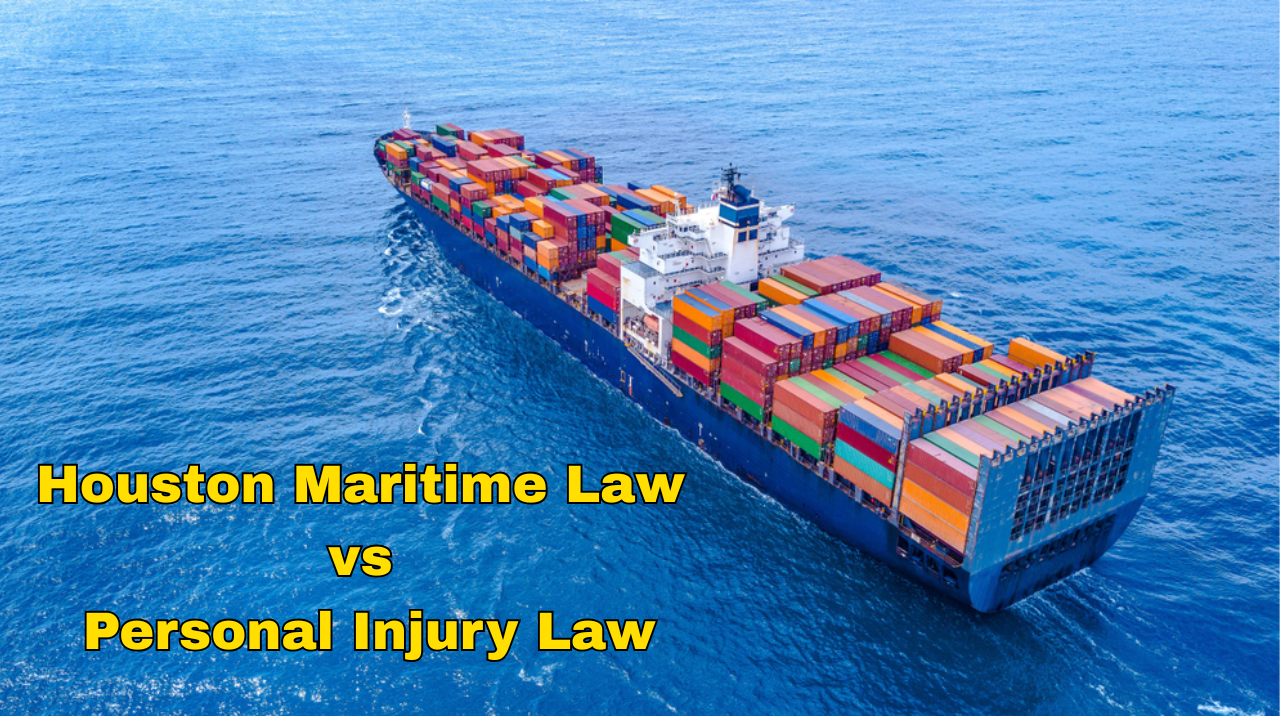Originally posted on September 20, 2025 @ 12:48 AM
Houston Maritime Law vs Personal Injury Law: When accidents happen, knowing what type of law applies can make all the difference in how your case is handled and what compensation you may receive. If you live in Texas, you may have come across the terms Houston Maritime Law and Personal Injury Law. At first glance, they may sound similar since both deal with injuries and legal rights, but they are not the same. In this article, we’ll break down Houston Maritime Law vs Personal Injury Law in simple terms, explore how they differ, and help you understand which one might apply to your situation.
What Is Houston Maritime Law?
Houston is home to one of the busiest ports in the United States, which makes maritime law especially important. Also known as Admiralty Law, maritime law covers legal issues that arise from accidents, injuries, and disputes on navigable waters like oceans, rivers, and ports.
Some examples where maritime law applies include:
-
Offshore drilling accidents
-
Ship and boat collisions
-
Injuries to longshore workers, seamen, or crew members
-
Cargo disputes or shipping contracts
-
Passenger injuries on cruise ships
Under maritime law, specific rules protect workers at sea. For instance, the Jones Act allows injured seamen to file lawsuits against their employers if negligence caused their injuries. This is different from traditional workers’ compensation laws that apply on land.
What Is Personal Injury Law?
On the other hand, Personal Injury Law applies to injuries that happen on land in everyday life. It’s a broad category that covers accidents caused by negligence, recklessness, or intentional harm.
Examples include:
-
Car accidents
-
Slip and fall injuries
-
Workplace accidents on land
-
Medical malpractice
-
Product liability cases
In personal injury cases, the injured person (plaintiff) usually seeks compensation for medical bills, lost wages, pain and suffering, and sometimes punitive damages if the other party was grossly negligent.
Houston Maritime Law vs Personal Injury Law: Key Differences
Although both legal areas deal with injuries, there are important differences between them. Let’s explore the main ones.
1. Location of the Accident
-
Maritime Law: Applies to accidents on navigable waters like seas, rivers, or harbors.
-
Personal Injury Law: Applies to accidents that occur on land.
2. Who Is Covered
-
Maritime Law: Protects seamen, dock workers, offshore oil rig workers, and sometimes passengers.
-
Personal Injury Law: Protects anyone injured due to negligence on land—drivers, pedestrians, patients, and employees.
3. Compensation Rules
-
Maritime Law: Often more favorable for injured workers at sea. For example, the Jones Act allows seamen to sue their employer, which is not typical in land-based workers’ compensation cases.
-
Personal Injury Law: Compensation depends on state laws, usually covering medical expenses, lost income, and damages for pain and suffering.
4. Jurisdiction and Courts
-
Maritime Law: Often handled in federal courts, though some cases can also be heard in state courts.
-
Personal Injury Law: Mostly handled in state courts under state negligence laws.
5. Statutes and Legal Standards
-
Maritime Law: Governed by federal maritime statutes and international treaties.
-
Personal Injury Law: Governed by state laws, which may vary widely across the U.S.
Why Understanding the Difference Matters
Knowing the difference between Houston Maritime Law vs Personal Injury Law is crucial because it determines:
-
Which court will hear your case
-
What type of lawyer you need
-
The kind of compensation you can expect
-
How quickly you need to act (since deadlines vary by law type)
For instance, if you are injured while working on a vessel in the Gulf of Mexico, your case falls under maritime law. But if you’re hurt in a car accident driving to the dock, personal injury law applies.
When Should You Hire a Maritime Lawyer vs a Personal Injury Lawyer?
-
Hire a Maritime Lawyer if:
-
You work on ships, oil rigs, or docks and were injured at sea or near the port.
-
You’re a seaman seeking compensation under the Jones Act.
-
Your case involves shipping contracts or vessel disputes.
-
-
Hire a Personal Injury Lawyer if:
-
You were injured in a car accident, slip and fall, or other land-based accident.
-
You want to file a medical malpractice or product liability claim.
-
Your injury occurred outside navigable waters.
-
Conclusion
Understanding Houston Maritime Law vs Personal Injury Law can be confusing, but the key difference comes down to where the injury occurred and who is protected. Maritime law is specialized and primarily protects workers at sea, while personal injury law applies more broadly to everyday accidents on land.
If you or a loved one has been injured, identifying which law applies to your case will help you find the right lawyer and ensure you pursue the proper compensation.
Whether your case belongs in maritime law or personal injury law, knowing your rights is the first step to protecting your future.
Houston Maritime Law vs Personal Injury Law FAQs
Q1: Can maritime law apply to recreational boating accidents?
Yes. If you’re injured on a recreational boat in navigable waters, maritime law may apply.
Q2: What is the Jones Act, and why is it important?
The Jones Act gives seamen the right to sue employers for negligence if they are injured while working. It’s a cornerstone of maritime law protections.
Q3: Do maritime workers get workers’ compensation like land-based employees?
Not usually. Instead, maritime workers rely on laws like the Jones Act or Longshore and Harbor Workers’ Compensation Act (LHWCA).
Q4: Which court handles maritime law cases in Houston?
Many maritime cases go to federal court, but some can also be heard in Texas state courts, depending on the issue.
Q5: Can I file both a personal injury claim and a maritime claim?
In rare cases, yes—if parts of your injury claim fall under both categories. An experienced attorney can guide you.
